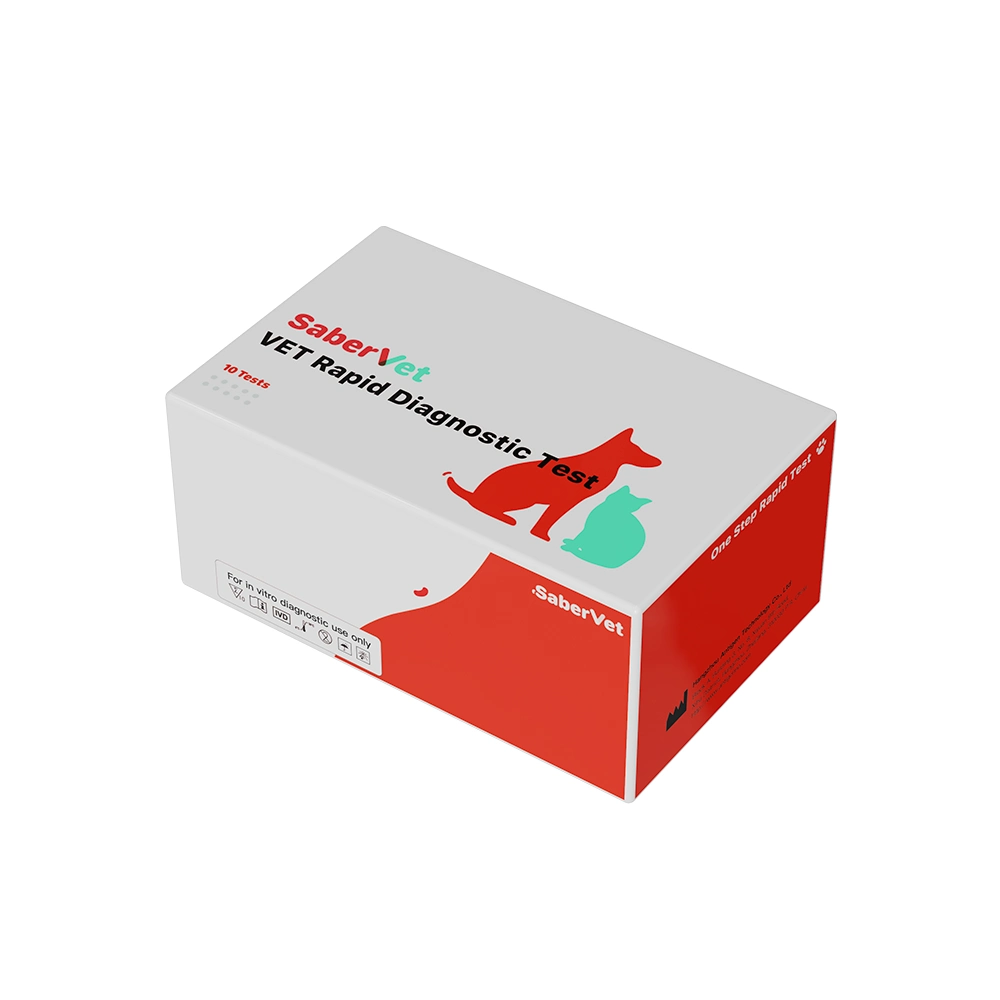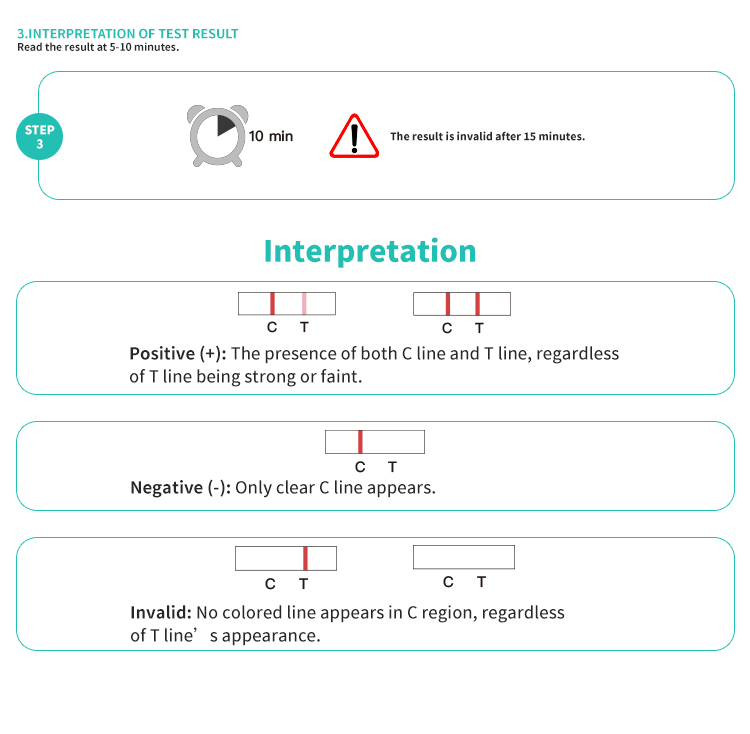Intended Use
Feline Immunodeficiency Virus Antibody/Leukemia Virus Antigen Combo Rapid Test is a lateral flow immunoassay intended for the simultaneous qualitative detection of specific antibody from feline immunodeficiency virus (FIV) and specific antigen from feline leukemia virus(FeLV) in feline whole blood/serum/plasma sample. The test is useful for simultaneous determination of FIV and FeLV infection.
Contents
| Component | 10T/Box |
| Test device | 10 piece |
| Dropper | 10 piece |
| Buffer | 10 piece |
Specifications
|
Product name
|
Feline Immunodeficiency Virus Antibody/Leukemia Virus Antigen Combo Rapid Test
|
|
Model Number
|
1091511810
|
|
Specimen
|
Whole Blood/Serum/Plasma
|
|
Kit Composition 1
|
Test device
|
|
Kit Composition 2
|
Dropper
|
|
Kit Composition 3
|
Buffer
|
|
Assay Time
|
5-10 minutes
|
|
Shelf Life
|
24 Months
|
|
Storage
|
4-30℃
|
|
Sensitivity(%)
|
99.85%
|
|
Specificity(%)
|
98.69%
|
|
Samples
|
freely
|
Operation
Results
Pathological Introduction
Feline immunodeficiency disease is a viral infectious disease caused by the feline immunodeficiency virus (Feline Immunodeficiency Virus, FIV), characterized by immunodeficiency, inflammation of the respiratory and digestive systems, dysfunction of the immune and nervous systems, and susceptibility to secondary infections.
This disease is widespread and more common in middle-aged and elderly cats. Due to the biological characteristics of the pathogen and the similarity of symptoms in infected cats to human AIDS, it is also called Feline AIDS (FAIDS). Initially, it was called Feline T-cell lymphotropic virus because FIV can replicate and damage T-cells.
Feline leukemia virus (FeLV) can cause various types of leukemia and other diseases in cats, such as lymphocytic, erythrocytic, and bone marrow cell proliferation or reduction, as well as enteritis, miscarriage, neurological abnormalities, etc. The types of diseases caused by different virus strains are not fixed and are related to different infection conditions and the constitution of the infected host.
Felv/fiv test Methods
After cats are infected withfeline immunodeficiency virus (FIV), the incubation period is very long, and even when clinical symptoms appear, they are often the result of combined action with other pathogens. Clinically, it is important to differentiate between feline AIDS and feline leukemia, as their symptoms are very similar, including lymph node enlargement, low-grade fever, stomatitis, gingivitis, conjunctivitis, and diarrhea. Antibody testing is usually performed using commercially available ELISA, immunofluorescence assay, and immunoblot test kits.
After cats are infected with feline leukemia virus (FeLV), routine testing methods can detect the virus through nucleic acid testing (PCR) or serum antibody testing using ELISA.
Conventional fiv felv testing methods require specific laboratory environments, professional personnel, and specialized equipment. Currently, the SaberVet Feline AIDS Antibody and Feline Leukemia Antigen Combo Rapid Test(fiv felv test)can rapidly detect feline immunodeficiency virus antibodies and feline leukemia virus antigens in blood, unaffected by environmental factors or personnel, and can quickly screen for feline AIDS and feline leukemia antigens.
The Feline Immunodeficiency Virus (FIV) Antibody/Leukemia Virus (FeLV) Antigen Combo Rapid Test, developed by Antigenne, is an animal disease diagnostic tool designed specifically for felines. It offers the following benefits:
Dual Detection: Our combo test detects both Feline Immunodeficiency Virus (FIV) Antibody and Feline Leukemia Virus (FeLV) Antigen, providing a comprehensive health assessment and ensuring that a single test covers the diagnosis of two serious diseases.
Fast results: The felv fiv test provides accurate results in as little as 10 minutes, helping pet owners and veterinarians make quick decisions about timely treatment and management measures.
Fiv and felv test with High accuracy: Antigenne uses advanced testing technology to ensure highly accurate results, which are more reliable than traditional methods and reduce the risk of misdiagnosis.
Simplicity and convenience: The felv fiv testing is simple and easy to perform, requiring no complex equipment or specialised skills, and can be operated by both pet owners and veterinarians, greatly improving ease of use.
Affordable: Compared to laboratory tests, Antigenne’s fiv/felv test are less expensive, providing pet owners and veterinarians with an affordable diagnostic option and helping to popularise disease screening.
Portable design: The product is lightweight and portable, allowing the felv fiv combo test to be performed at any time, whether at home or in the clinic, guaranteeing that your cat’s health is known at all times.
Antigenne’s Feline Immunodeficiency Virus Antibody/Leukemia Virus Antigen Combo Rapid Test provides a reliable safeguard for feline health, helping pet owners and veterinarians diagnose and manage FIV and FeLV in a timely and accurate manner, and improving the cat’s quality of life.
Treatment Plan
After diagnosis, immediately isolate the sick cat from healthy cats. Provide nutritious food to healthy cats to enhance their immune system, and conduct regular physical health checks. Currently, there is no effective treatment, so symptomatic treatment is the main approach. Antibiotics can be used to prevent secondary bacterial infections. Intravenous fluids can be administered to provide nutrition and correct dehydration. Antiviral drugs can also be given.
During the illness, the sick cat should refrain from eating and drinking to avoid worsening vomiting, which can affect intestinal cell replication and reduce intestinal bacterial content. Supportive therapy can be used to maintain fluid and electrolyte balance, and sensitive antibiotics can be injected through non-intestinal routes to prevent bacterial invasion in the damaged intestines.
For cats with severe fluid imbalances, plasma and other colloid substances can be administered, and antiemetic drugs can be given to cats with severe vomiting.
As Antigenne moves forward with its vision of revolutionizing animal disease detection, the launch of its own brand, SaberVet, marks a significant milestone in the company’s journey. With six years of industry experience, Antigenne has built a solid foundation of knowledge and expertise in developing efficiently and accurate diagnostic reagents.
The creation of SaberVet not only reinforces the company’s commitment to quality and innovation but also serves as a testament to its unwavering dedication to improving animal health and welfare. Together, we can make a difference. Contact Antigenne now and let’s unlock the future of animal health.















